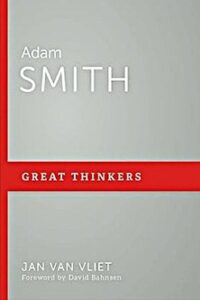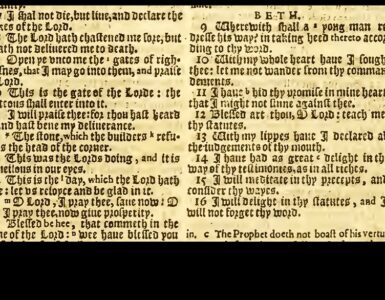 Continuing the Great Thinkers series, P&R has released Adam Smith by Jan Van Vliet, with a forward by David Bahnsen. Van Vliet is uniquely qualified to interpret Smith because his professional experience includes work as an economics consultant, professor emeritus of economics at Dordt University, and several years teaching Bible and theology at Prairie College. The marriage of economic expertise with Christian presuppositions brings to Van Vliet’s analysis of Smith inciteful scrutiny of not only his money matters but also as a man made in the image of God. The book succinctly covers Smith with five chapters, 129 pages of text, a helpful glossary of terminology, a bibliography, and an index. The glossary is especially helpful for individuals who have limited knowledge of the discipline of economics.
Continuing the Great Thinkers series, P&R has released Adam Smith by Jan Van Vliet, with a forward by David Bahnsen. Van Vliet is uniquely qualified to interpret Smith because his professional experience includes work as an economics consultant, professor emeritus of economics at Dordt University, and several years teaching Bible and theology at Prairie College. The marriage of economic expertise with Christian presuppositions brings to Van Vliet’s analysis of Smith inciteful scrutiny of not only his money matters but also as a man made in the image of God. The book succinctly covers Smith with five chapters, 129 pages of text, a helpful glossary of terminology, a bibliography, and an index. The glossary is especially helpful for individuals who have limited knowledge of the discipline of economics.
Adam Smith (1723-1790) was a prominent member of the Scottish Enlightenment which was a movement in philosophy that questioned rationalism as the approach for determining truth in favor of a science of human nature that determines truth through the moral sense and given truths. Smith admired greatly one of his professors at the University of Glasgow, Francis Hutcheson (1694-1746), who was important for the development of common-sense realism, but on the other hand, another friend was the skeptic empiricist philosopher David Hume (1711-1776). Van Vliet’s critical interaction focuses primarily on two works by Smith. The first was published in 1759 bearing the title The Theory of Moral Sentiments, which proved popular because it was republished in its sixth and final edition in 1790. The second work is Smith’s more famous, The Wealth of Nations (An Inquiry into the Nature and Cause of the Wealth of Nations, 1776). Van Vliet describes the pair as a “one-two punch” for advocating a market economy that promotes a “free and virtuous society” (xi, xiv). However, much as some individuals in American politics have appealed to Alexis de Tocqueville’s Democracy in America without reading it, so public policy personnel appeal to Wealth for support of their economic agendas by attributing views to Smith that he did not hold. Three categories of economics that Van Vliet says, “are not Smithian doctrines” include: a market economy is self regulating, the profit motive drives rational behavior, and self-interest alone guarantees “socially productive behavior” (7). Smith is looked to for supporting a free-market economy, which is appropriate, but it is important to understand what he said about free market economics in light of the values expressed in Moral Sense.
Van Vliet turns to Cornelius Van Til’s Christian Theistic Ethics (1980), as well as the writings of Geerhardus Vos and Abraham Kuyper to develop his case as he compares Smith’s society to the Kingdom of God. Smith’s prosperous, virtuous, and benevolent society developed from both Moral Sense and Wealth has lessons for the current economic situation that pays little attention to virtue and ethics (129). Despite common perceptions that Smith’s system promoted a dog-eat-dog political economy, a careful and full reading of Smith shows “Smith always sided with the poor and underprivileged” (128). For Smith as is the case for de Tocqueville and others, primary sources are the resource for understanding a writer’s ideas, and the Christian’s concern for not bearing false witness should lead to a fair analysis. Van Vliet shows that Smith opposed monopolies, despised greed, and promoted benevolence. Van Vliet does not use the term but his critique of Smith in light of the KIngdom provides a basis for “the common good” so well expressed in the preamble to the United States Constitution.
Jan Van Vliet’s book is an informative and beneficial read for anyone interested in Adam Smith, economics in general, or a Christian approach to economics. He concludes the chapter titled, “The Interplay of Human and Commercial Society,” appropriately with the following:
Adam Smith’s social philosophy and political economy represent wonderful and commendable social goals and economic structures toward which to work, but only the moral and theological commitments of Christian theism can deliver such a world with ultimate absolute certainty in lives self-consciously lived coram deo (125).
I would add, “Put not your trust in princes, in a son of man, in whom there is no salvation. When his breath departs, he returns to the earth; on that very day his plans perish” (Psalm 146:3,4, ESV).
Barry Waugh
Notes—The copy of Adam Smith used for this review was purchased by the reviewer. The leather-bound books on shelves picture in the header is from pixabay.





